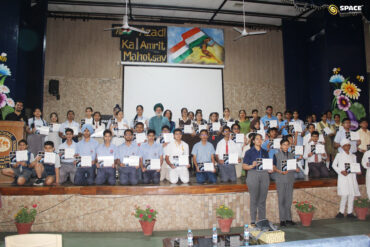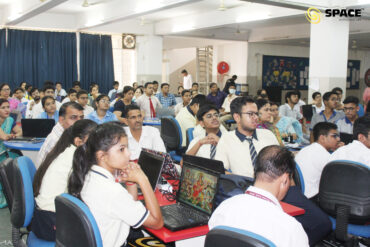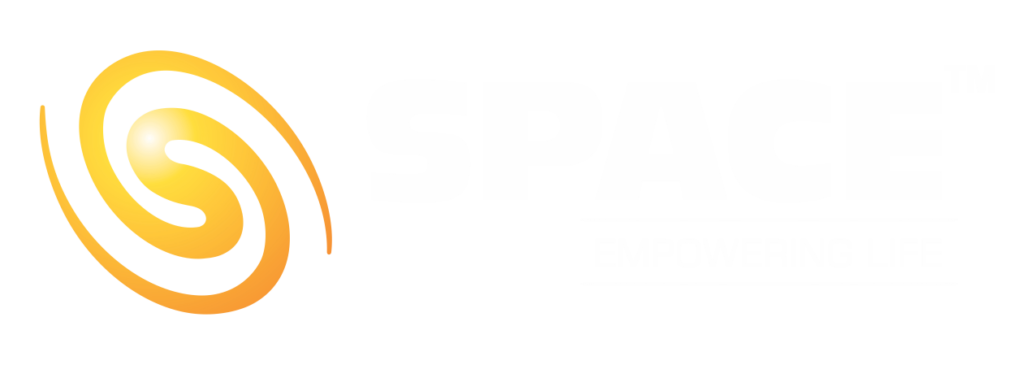The All India Asteroid Search Campaign Training Workshop aims to ignite a passion for astronomy and engage aspiring astronomers in the exciting field of asteroid discovery. The All India Asteroid Search Campaign (AIASC) 2023, is a Citizen Scientist Programme by NASA that encourages students and amateur astronomers to contribute to the discovery and tracking of asteroids. The campaign utilizes the powerful Asteroid Search Tool developed by the International Astronomical Search Collaboration (IASC) to analyze astronomical data. The AIASC Training Workshop serves as a platform to equip participants with the necessary skills and knowledge to conduct asteroid searches effectively. The workshop combines theoretical learning sessions, practical training, and hands-on experience with real data. Participants gain valuable insights into the techniques used for identifying and confirming potential asteroids. The objective of this workshop was to Educate participants about asteroids and familiarize the participants with observational techniques, data analysis tools, and resources for asteroid search campaigns.

AIASC has been successful in discovering several new asteroids and comets through students, it is all about giving an opportunity to India’s, school students to find real asteroids in outer space under its internationally acclaimed program, All India Asteroid Search Campaign (AIASC) 2023, in collaboration with International Astronomical Search Collaboration (IASC), is conducted by Dr. Patrick Miller of Hardin Simmons University, USA. All India Asteroid Search Campaign 2023 workshops were organized by SPACE for the schools in Jaipur, Mohali, and Delhi. The students of these schools will be participating in Phase I/ Phase II of AIASC 2023. AIASC is a great example of how citizen science initiatives can help to advance scientific research and engage the public in important scientific issues. By involving students in the search for asteroids, AIASC not only contributes to scientific knowledge but also inspires the next generation of scientists and engineers. Through the training provided by SPACE to Indian students, have achieved a remarkable number of 2 Asteroid Discovery, 80 Provisional Discoveries of Asteroids, 2 Special Discoveries, 11,560 Preliminary Discoveries of Asteroids, 62 Near-Earth Object Confirmations, and 1636 Near-Earth Object Observations. For Phase I, SPACE organized the training workshop for AIASC in three different States of India- Shri Venkateswar International School (SVIS), Delhi; Doon International School, Mohali, and Bhartiya Vidya Bhavan Vidyashram, Jaipur were 200+ students from different Schools became a part of AIASC training workshop.
The workshop was full of energy and excitement starting with the registration process till the Astrometrica Software Training. Students with their respective School coordinators were really excited to learn Science about Asteroids, Astrometrica Software Installation, software training, and program steps of AIASC. They shared their experience of how they have always heard about the asteroids and comets being discovered and this time they will get a chance to witness and make a discovery themselves. During the workshop training, we provided students with an AIASC kit that involved every information required in the AIASC program steps, so that, even if they miss out a step or want to practice the program steps on their own they could easily be guided by the book, students and their co-ordinators both were provided with a participation and appreciation certificates. We also had two chief guests who contributed to the training workshop with their knowledge and guidance- Mr. Joy Gardner, chairman, of Hope and Beyond, and Mr. Kulinder Pal Singh, INSA Senior Scientist. The AIASC Training Workshop has a profound impact on participants, igniting their curiosity about the cosmos and inspiring them to pursue careers in astronomy and space sciences. It strengthens the foundation of amateur astronomy in India and cultivates a network of passionate individuals dedicated to contributing to the scientific community.

SPACE has been organizing AIASC for the last 14 years, it brought the ‘All India Asteroid Search Campaign (AIASC)’ as a part of an educational initiative. Through AIASC, students or interested people irrespective of their age can gain exclusive access to celestial images. Students are given datasets of photographs taken by the telescope to analyze and are trained on how to report them. The AIASC allows participants to search for new asteroids and comets in our solar system. In case of a discovery, the participant names are listed as part of the preliminary discoveries. After observing the discovery for a few years by NASA, if confirmed, the team who discovered it is allowed to name the asteroid, endorsed by IHOU, IASC, PanSTARRS, and NASA on successful completion. We have been organizing AIASC in collaboration with IASC. The International Astronomical Search Collaboration (IASC), is a citizen science program that provides high-quality astronomical data to citizen scientists around the world.

The All India Asteroid Search Campaign Training Workshop is a remarkable opportunity for students and amateur astronomers to engage in meaningful scientific endeavors. Through this collaborative effort, India’s astronomy community continues to expand its knowledge of the cosmos while inspiring the next generation of astronomers and space scientists. It would be both fun and a learning experience for anyone who wants to be a part of AIASC. SPACE is enabling students to get training in advanced data analysis and software as well as interact with international scientists, all of which build up to an invaluable real-time research experience. Through AIASC, students have made confirmed discoveries of Main Belt Asteroids and important observations that contribute to the NASA Near-Earth Object (NEO) Program at the Jet Propulsion Laboratory (Pasadena, CA). By involving students in the search for asteroids, AIASC not only contributes to scientific knowledge but also inspires the next generation of scientists and engineers. The AIASC has helped to create a culture of scientific curiosity and engagement among students and the general public in India. It has also contributed to the global effort to track and monitor potentially hazardous asteroids, essential for protecting our planet from potential impacts.


